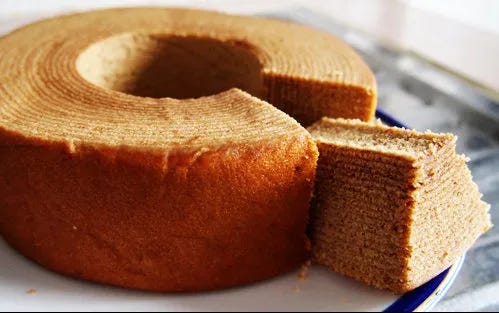20 One-Sentence Writing Truths
For the aspiring and the professional alike
Good writing is hard.
Good writing is much more than the product the readers view on the page.
Good writing of any kind involves the background inputs of reading, thinking, connecting, musing, drafting, dreading, scrapping, honing, drafting again, believing, trusting, in all particular orders, in no particular order, all at once.
It’s like baking a Baumkuchen. Never heard of it?
A Baumkuchen is a European dessert, one of the hardest to bake. You make the batter and pour it in thin layers over a continuously revolving spit in front of an open flame. Each layer browns before the next one is added. It can take more than four hours.
Like baking this bad boy, writing is an involved process.
At any point, there’s a chance for a deep dark night of the soul. You’re up against a deadline, you’re up against your own high internal bar, and you’re up against an elusive alchemy:
Making thoughts and ideas come to life on a page in a way that cuts to the core. In a way that makes the readers’ minds blow open, makes their hearts sing in resonance, makes their souls uplift.
(Or makes them hit the call-to-action and cha-ching.)
Sincerely, writing is a challenge, a rewarding one worth failing for.
It pays to have some crisp, crystalline electrolytes to goose you on your way. So, here’s some writing insights, culled from experience and inspirations and variations of thought from a vast lineage of writers, artists, and creatives. On whose shoulders I stand and wobble.
20 One-Sentence Writing Truths
To write from the heart, you need to write with courage, which means shedding skin and getting vulnerable.
To write well, you need to edit without mercy, “kill the darlings” of the writings of the heart, let go of all precious words that don’t serve a unique truth and logic.
Writing is following: your process, your attention, your curiosity lead the way, and you relax into it to find out where they go.
Writing is leading: your words, your rhythm, your choices chart a course for the reader, who is precious cargo, like a baby on board.
All that comes to pass in our lives, our joys and our misfortunes, the triumphs and the shames, are resources for the art, and they too are precious cargo.
Writing is hard, and it always will be, but practice makes even hard tasks familiar, even the task of unemptying a blank page.
Writing is a gift for one who wants to learn continuously; no act better forces deep learning than (the prospect of) sharing it with an audience.
Curiosity about how others (and the “other side”) live, think, and feel is the seed, the sun, and the water for any good writing, be it fiction or blogging.
Judging a rough piece or an idea harshly and early shortcuts the holy emergence that can body forth if you follow the thread dispassionately.
On an off day, the blank page can be a bad trip; when confronted with that, blow up time: think of your grandkids’ grandkids, or your grandma’s great-grandma, those whom you’ll never meet, who want to know you…. what would you share with them today?
Writing is two games — one of authenticity and vulnerability, and one of engineering impact and exploiting the reader’s receptivity — and learning how, when, and why to play each game is the craft.
Systemic forces are contriving to make moments of soul and deep thinking inconsequential; writing is resistance against those forces.
The saddest story and the harshest truth, when written with care and transcendent beauty, will raise the spirits of the reader.
Our minds crave binaries, the black and white, but writing makes rapturous the delicate gradations inherent in all things.
The blank page and the monkey mind will breed a sense of fear and shame about our own experience, thoughts, and insights (or lack thereof), but there is nothing to fear, there is no shame, full stop.
The universe loves boldness, and writing, in its boldness, demands that our fragile egos be on the ride, but ego, at times, can’t ride with that universal resonance without a buffer: the inner critic is that buffer.
Care is the cornerstone of good writing; if you care about your subject, your delivery, your reader, a magic and resonance will bloom from it.
A common misconception is that the longer, more erudite word contains more value and impact, but really, most truth, humor, and punch, in earnest, can be carved in four-letter words.
Don’t aim to write the Great American Novel; write one crisp, true paragraph, ship it, and repeat.
There’s literally nothing to it, nothing more you need to do to grow as a writer than to sit down now, today, and write — give that gift back to the world.
Thanks for reading. Do you have other writing tips? I’m always looking for more.
And if you found this post useful, please click below to subscribe for more resources and reflections like this.
Have a sweet day.
-Griff

